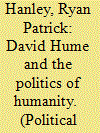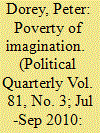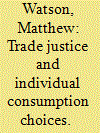|
|
|
Sort Order |
|
|
|
Items / Page
|
|
|
|
|
|
|
| Srl | Item |
| 1 |
ID:
103754


|
|
|
|
|
| Publication |
2011.
|
| Summary/Abstract |
Recently a call has gone up for a revival of the "politics of humanity." But what exactly is the "politics of humanity"? For illumination this paper turns to Hume's analysis of humanity's foundational role in morality and modern politics. Its aims in so doing are twofold. First, it aims to set forth a new understanding of the unity of Hume's practical and epistemological projects in developing his justifications for and the implications of his remarkable and underappreciated claim that humanity is the only sentiment on which a moral system can be founded. Second, by attending to Hume's substantive definition of humanity and its relationship to benevolence and sympathy in particular, it aims to clarify the relationship between the principal elements of the politics of humanity: "humanism" or secularism, "humane" or other-directed values, and mutual recognition of our shared "humanness."
|
|
|
|
|
|
|
|
|
|
|
|
|
|
|
|
| 2 |
ID:
099087


|
|
|
|
|
| Publication |
2010.
|
| Summary/Abstract |
Inequality in Britain today is now so deep that the top 10 per cent own 100 times more than the bottom 10 per cent, yet there is remarkably little public concern or anger about poverty. Indeed, compassion and concern for the poorest in society has actually declined in recent years due to the continued, and even increased, prevalence of the view that poverty is largely caused by laziness and lack of willpower, or is simply an unavoidable fact of modern life. Either way, many people tacitly accept that 'the poor will always be with us'. Moreover, much of the British public believes that there are sufficient opportunities to succeed for those who try hard enough, and also that it is the middle class which actually struggles the most, economically or financially. These assumptions are highly conservative in their ideological and political implications because they limit public support for egalitarianism and extensive wealth redistribution from rich to poor.
|
|
|
|
|
|
|
|
|
|
|
|
|
|
|
|
| 3 |
ID:
179291


|
|
|
|
|
| Summary/Abstract |
This article is the first to report the nationwide public support rate for the death penalty in China. Using a national representative sample with 31,664 respondents, it shows that 68 per cent of China's citizens are for the death penalty, while 31 per cent are opposed to it. These numbers suggest that support for capital punishment in China, although strong, is much weaker than in some other East Asian jurisdictions and less than first assumed by commentators. However, contrary to previous notions that public support for the death penalty derives from uninformed popular prejudice, it is the elites in China – i.e. those who receive higher education – who are more in favour of the death penalty. Further empirical analyses suggest that this is not because of political ideology or fear of crime. Rather, the reason is likely that the elites know fewer, and sympathize less with, criminal offenders, who generally come from underprivileged groups. These findings challenge a range of prevailing perceptions of public attitudes to the death penalty in China, especially the culture explanation for the Chinese public's punitiveness, and have important policy implications.
|
|
|
|
|
|
|
|
|
|
|
|
|
|
|
|
| 4 |
ID:
117466


|
|
|
|
|
| Publication |
2012.
|
| Summary/Abstract |
Examines the responses of the Russian Federation (RF) and People's Republic of China (PRC) to the September 11 attacks on the United States. He argues that the sudden shift in RF and PRC policies toward the United States following the attacks poses a puzzle for existing IR theories. In order to comprehend RF and PRC behavior, he claims that we need to recognize the role of implicit norms of sympathy.
|
|
|
|
|
|
|
|
|
|
|
|
|
|
|
|
| 5 |
ID:
077418


|
|
|
|
|
| Publication |
2007.
|
| Summary/Abstract |
A consistent theme of the existing literature is that fair trade consumption practices represent acts of justice. In this article I investigate such an equation from the perspective of the moral theory of Adam Smith. Smith explains the development of moral sensibilities via an imaginative act he calls `sympathy'. For Smith, justice prevails in interpersonal relationships in which the potential for one person to do harm to another is ruled out because their respective imaginations are in perfect accord, thus creating a situation of mutual sympathy. I advance two main conclusions. First, I argue that fair trade consumption is undoubtedly a moral act in the manner described by Smith, as it involves consumers responding to fair trade campaigns in order to trigger their moral sensibilities through exercising their imaginative faculties. Second, though, I argue that fair trade consumption is not specifically a moral act of justice in the manner described by Smith. The structure of fair trade invites the First World consumer to display sympathy for the Third World producer, but it provides no means for that sympathy to be reciprocated. As such, instances of genuine mutual sympathy do not arise. From a Smithian perspective, fair trade consumption practices are an act of beneficence rather than an act of justice. They thereby reside in the realm of private virtue rather than the realm of public duty, with significant implications for the way in which trade justice is conceptualized and studied in IPE
|
|
|
|
|
|
|
|
|
|
|
|
|
|
|
|
|
|
|
|
|